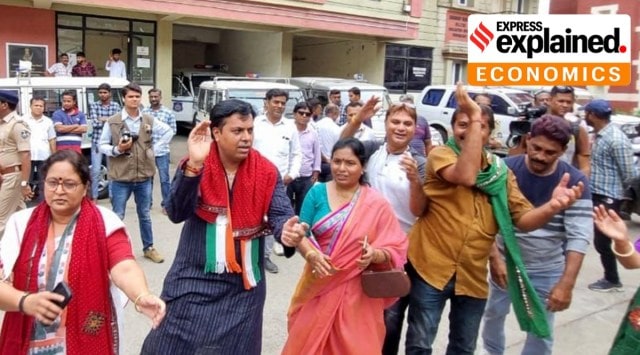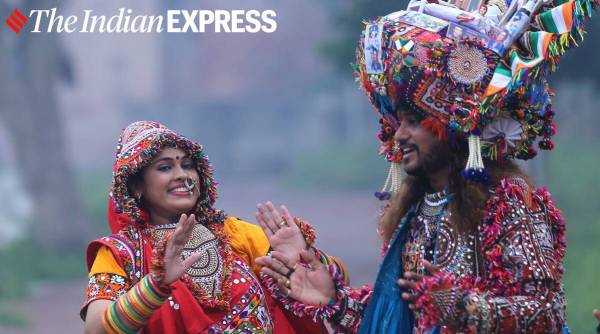- India
- International
Explained: The row over 18% GST on Navratri garba events in Gujarat
A controversy has broke out over the imposition of 18 per cent Goods and Services Tax (GST) on garba passes this year. Why has GST not been levied so far? What are the GST rules for entertainment/commercial events, which garba has now been counted under?
 Vadodara Congress workers protest in front of collector’s office against the imposition of GST on garba events. (Express Photo)
Vadodara Congress workers protest in front of collector’s office against the imposition of GST on garba events. (Express Photo)
Navratri garba – the nine nights of dance as an obeisance to Goddess Ambe – is one of the most-awaited and revered festivals in Gujarat, with revellers and devotees booking passes to the biggest garba venues months in advance.
With many organisers opening bookings for the upcoming Navratri festival, to be held from September 26 to October 5, a controversy has broken out over the imposition of 18 per cent Goods and Services Tax (GST) on garba passes this year. Exemption from the GST only applies to organisers charging less than Rs 500 per pass.
Demanding a rollback, the Congress party protested by doing garba outside the collector’s office in Vadodara. On Thursday (August 4), Congress’s Rajya Sabha MP Jairam Ramesh called it the ‘Garba Samaapt Tax’ (Garba-ending tax).
First, what is the garba and why does the government promote it?
‘Navratri’ is a Gujarati word meaning the festival of nine nights. While celebrated nationwide, the festivities stand out in Gujarat due to the rich garba dances, done to pay respect to and worship Goddess Amba. The festival involves worshipping a lamp placed in perforated earthen pots, which is symbolic of the power of the Mother Goddess and denotes her ‘garbha’ or womb that brings new life.
Traditionally, the garbas began with women celebrating feminity, divinity and fertility of the Goddess, dancing in circles that involved foot tapping and claps. Slowly, it turned into a festival of merriment for anyone who joined in the dance. In the age when social media and mobile internet were still unheard of, garba grounds also turned into the first literal dating sites where many couples met.

Garba festivities in Gujarat have attracted tourists from the world over, prompting the government to promote it. Since 2003, the Gujarat government under then chief minister Narendra Modi has hosted ‘Vibrant Navratri’, the state’s official Garba event in Ahmedabad. As the Garba starts in the evenings and goes well past midnight, it has also become an event to showcase women’s safety in Gujarat. Modi as the CM promoted the event as “the World’s Longest Dance Festival”.
What is the controversy over GST on garba passes in Gujarat?
It is for the first time since the implementation of the GST system in 2017 that Garba venues are charging direct GST on entry tickets. In Vadodara, the United Way of Baroda (UWB), the biggest garba organiser in the state, opened its registrations last week. Patrons saw a sharp rise in the registration fee, and a note said it was “inclusive of 18 per cent GST”. Men participating will have to pay Rs 4,838 this year, while it is Rs 1,298 for women.
GST officials claim the garba organisers “failed” to comply with the central government notifications of 2017 and 2018 by not charging GST on entry tickets. This was pointed out during inspections of organisers in Vadodara, the city known as the hub for garbas, in 2019. Because of the pandemic, the state did not see large-scale festivities in 2020 and 2021.
While Opposition parties are lashing out at the BJP for levying a “hefty tax” on a religious event, leaders within the party are also fielding requests from organisers and participants to have the garba excluded from the tax purview.
Minesh Patel, Treasurer and Trustee of the UWB, said that during the inspections in 2019, officials “pointed out issuing passes or identity cards for a fee or against an invoice would automatically make it liable for GST.” He added, “Although we did not receive any direct notice, they have clearly stated that passes issued against any payment will attract GST. So, to comply with the taxation laws in place in India, we have added the GST this year.”
Mayank Patel of the Vadodara Navratri Festival (VNF), the second biggest organiser in Vadodara, said they contribute the collection to the Police Welfare Fund, and will not pass the burden on participants. “The tickets for male participants are priced at Rs 1,000 and above, but we have decided to pay the 18 per cent GST component from the collections instead of adding the cost on the tickets,” he said.
What are the GST rules for entertainment/commercial events, which garba has been counted under?
According to officials of the GST department in Gujarat, no changes have been made to the GST. A top GST official told The Indian Express, “No new GST has been imposed on the garba. In the pre-GST period, a service tax of 15 per cent was levied on entry if the amount charged for admission to such events exceeded Rs 500 per person. In addition, there were embedded taxes as the credit of VAT paid on goods used for such events was not available for payment of service tax.
“Currently, too, GST at the rate of 18 per cent is payable only if the entry ticket for any garba or such event exceeds Rs 500 as per the notification of the Department of Revenue of the Union Ministry of Finance, dated June 28, 2017 [Notification No. 12/2017-CT(R)]. Thus, the tax under the GST regime has remained the same as the pre-GST regime,” the GST official added.
The official cited a recommendation made by the 25th GST Council Meeting held on January 18, 2018, for granting relief from GST to events such as circus, dance, theatre, some other performances, and recognised sporting events. “The Council has recommended that the threshold limit on the price of admission tickets for the purpose of GST exemption on circus, dance, and other events may be increased from Rs 250 per person to Rs 500 per person”, the officer said.
From January 25, 2018, admission tickets to events priced less than the threshold got the exemption, to promote cultural and sports events.
 Dancers in the traditional Garba attire near Jamalpur. (Express photo by Nirmal Harindran)
Dancers in the traditional Garba attire near Jamalpur. (Express photo by Nirmal Harindran)
So then why was GST not levied in the last four years?
According to the UWB, garba was never considered an “entertainment event” on which GST could be levied. Hemant Shah, Chairman of the Resource Development Committee of the UWB, said, “We do pay GST for food stalls and other services used for garba but until 2019, the actual passes were never seen as meant for a commercial sale… the UWB is an NGO and the money received from passes is meant to be a donation.”
He added, “For us, the garba is not a commercial activity but a devotion to the Goddess and 18 per cent is a huge amount. For us, every penny saved is every penny earned in undertaking activities for the poor and vulnerable.”
Like the UWB is an NGO, the VNF is also a trust formed under the aegis of the government of Gujarat, primarily to raise contributions for the state police welfare fund.
But there is no exemption for ‘donations’. An official said, “The term ‘donation’ does not apply in the case of garba tickets, simply because these organisers are issuing invoices and selling the passes. Wherever there is an invoice, there is a tax. Anything that involves a sale is automatically a commercial activity deemed to be for profit.”
“So, organisers cannot take shelter in the name of donation just because it is a part of a religious festival. If that is the case, it should be free,” the official said, adding prices can be kept under Rs 500 for avoiding the tax.
For the organisers, issuing fresh tickets for all nine nights to evade the 18 per cent slab is also a logistical issue.
Mayank Patel explained the issue of Radio Frequency Identification (RFID) cards, a wireless identification system used in the events. “It is mandatory for security purposes to issue RFID identity cards to players, in order to be able to track down the participant for any law and order problem. It is not possible to issue one RFID card for each night because the expense of that would be Rs 200 per card per night.
“It would be chaotic to have thousands of players queuing up at venues for passes every day. We have no choice but to issue a package of nine nights, which will obviously fall under the tax purview,” Patel added.
Why is garba counted as a commercial event?
Often, commercial garbas are hosted by clubs or organisations like the UWB, which could be a group of industrialists, politicians, and people who work for social causes.
Most of the popular garba venues in major cities have entry passes priced at Rs 1,000 and above. According to organisers, garba festivities run into a commercial business of over Rs 7,000 crore annually, including the profit of large-scale commercial garbas, and allied businesses like decorators, caterers or individual food stalls, sound systems, etc.
Commercial venues also have prizes at the end of nine nights – bumper prizes include four-wheelers and two-wheelers. While commercial garbas are organised with grand decorations, celebrity visits, and expensive tickets, sheri garbas are the neighbourhood ones, organised by local residents with limited crowd and sponsorship. Many turned to them in the pandemic years.
Garba grounds see thousands of people swaying to Gujarati folk music in concentric circles for four to six hours, often continuously. The largest one is held in Vadodara by the UWB, which sees 30,000 participants at any point and 15,000 viewers, who must also purchase tickets to witness the spectacle.
More Explained
EXPRESS OPINION
Apr 19: Latest News
- 01
- 02
- 03
- 04
- 05








































